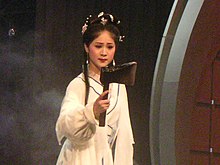Shaoxing opera
| Shaoxing opera | |||||||

Li Xudian performs in a Shaoxing opera.
|
|||||||
| Traditional Chinese | 紹興戲 | ||||||
|---|---|---|---|---|---|---|---|
| Simplified Chinese | 绍兴戏 | ||||||
|
|||||||
| Yue opera | |||||||
| Traditional Chinese | 越劇 | ||||||
| Simplified Chinese | 越剧 | ||||||
|
|||||||
| Transcriptions | |
|---|---|
| Standard Mandarin | |
| Hanyu Pinyin | Shàoxīng xì |
| Transcriptions | |
|---|---|
| Standard Mandarin | |
| Hanyu Pinyin | Yuèjù |
Shaoxing opera, also known as Yue opera, is the second most popular opera form out of over 360 opera genres in China. Originating in Shengzhou, Zhejiang Province in 1906, Yue opera features actresses in male roles, as well as femininity in terms of singing, performing, and staging. Over time, it grew in popularity. Only Peking opera is more popular. It is highly popular in Zhejiang, Shanghai, Jiangsu and Fujian, while its audiences are all over China.
Prior to 1906, Yue opera was initially an entertainment for people in Sheng County. Its lyrics are mostly collected from conversations between farmers while they were working. Audiences love these ballads because of their vivid description of daily life. The Second Opium War interfered with the local economy of Sheng County, located in the Jiangnan area, near Shanghai. Since Sheng County agriculturalists were experiencing difficulty earning their livelihoods, they started to turn this folk art into a second source of income.
Over years, the accumulation of lyrics built up the fundamental source materials for Yue opera, and the folk music gradually developed its own style. Performers also began to integrate simple acting and accompanying instruments into the folk music. It gradually became well known, both in Sheng County and neighboring counties.
At the end of the first month of the lunar year Zhēngyuè (simplified Chinese:正月) in 1906, artists gathered together in Chen Wanyuan (simplified Chinese: 陈万元)'s house. Although these artists had never performed together before, Chen and other residents encouraged them to cooperate. The first performance was thus generated. Fortunately, the show turned out to be a great success, and residents were delighted and willing to talk about it.
Over time more and more counties invited them to perform. Because the music's tones were similar to those of Shange (Shān Gē,山歌) people named this art Small Literal Class (pinyin: Xiao Gē Wén Shū Bān, simplified Chinese:小歌文书班).
...
Wikipedia
